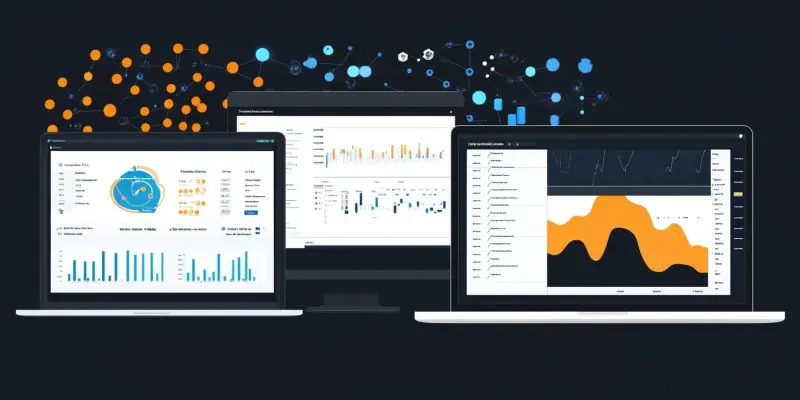The landscape of data science is rapidly evolving, driven by advancements in technology and the increasing importance of data-driven decision-making. By 2025, the demand for specialized data science roles is expected to surge, transforming the way businesses operate and innovate. As organizations recognize the power of data to drive strategic decisions and foster innovation, the need for professionals with advanced analytical and technical skills will grow significantly. This shift will pave the way for numerous specialized job profiles, each addressing particular facets of data science and requiring unique competencies.
The Core Role: Data Scientist
Data scientists will remain at the heart of the data science field, playing a crucial role in analyzing and interpreting large datasets. They develop models, test hypotheses, and extract actionable insights that help businesses maintain a competitive edge. Mastery of programming languages such as Python or R, along with a strong foundation in statistics and machine learning, is essential for success in this role. Data scientists excel in solving complex problems and adapting to the rapid changes in business environments. Their ability to translate data into meaningful insights will continue to be invaluable, driving strategic decision-making across various industries. As businesses increasingly rely on data to guide their strategies, the demand for skilled data scientists is expected to grow significantly.
Moreover, data scientists will be essential in developing predictive models that help companies forecast market trends, customer behavior, and business performance. They will collaborate closely with other teams, including marketing, finance, and product development, to ensure that data-driven insights are integrated into critical business strategies. As a result, organizations will seek data scientists who possess not only technical expertise but also strong communication and collaborative skills. By 2025, data scientists will be instrumental in driving innovation and creating value across diverse sectors, from healthcare to retail and beyond.
Building Intelligent Systems: Machine Learning Engineer
Machine learning engineers specialize in creating systems that learn and evolve over time. Their role involves building and deploying algorithms used in recommendation systems, image recognition, and fraud detection. Proficiency in frameworks like TensorFlow or PyTorch and experience with cloud platforms are essential for these professionals. Machine learning engineers facilitate the integration of intelligent systems into everyday applications, making them indispensable in the tech-driven future. Their expertise in developing and optimizing machine learning models will be critical in advancing AI technologies and enhancing user experiences across various sectors.
As machine learning continues to reshape industries, the demand for skilled machine learning engineers will surge. These professionals will need to stay abreast of the latest advancements in AI and machine learning, ensuring that their models remain effective and efficient. They will also play a key role in addressing ethical considerations, such as bias in algorithms and the transparency of AI systems. By 2025, machine learning engineers will be at the forefront of technological innovation, driving the development of intelligent solutions that improve efficiency, accuracy, and user satisfaction in various applications.
Ensuring Data Flow: Data Engineer
Data engineers focus on ensuring efficient data flow within organizations by designing, building, and maintaining data pipelines. They manage massive datasets using tools such as Apache Spark, Hadoop, and SQL, which are essential for real-time analytics. The role’s importance is underscored by the growing demand for seamless data integration and processing capabilities. As businesses continue to generate and rely on vast amounts of data, the need for skilled data engineers will increase. Their ability to create robust data infrastructures will be crucial in supporting advanced analytics and enabling data-driven decision-making.
The evolution of data engineering will see professionals tackling challenges related to data quality, security, and scalability. They will work closely with other data professionals, such as data scientists and analysts, to ensure that data is readily accessible and usable. Additionally, data engineers will need to stay updated on emerging technologies and best practices to maintain the efficiency and reliability of data pipelines. By 2025, data engineers will play a pivotal role in enabling businesses to harness the power of big data, driving insights and innovation across various sectors.
Transforming Data into Insights: Business Intelligence Analyst
Business intelligence analysts convert raw data into meaningful insights through visualization tools like Tableau and Power BI. They create reports and dashboards that guide decision-making processes, emphasizing collaboration with stakeholders to identify trends, opportunities, and areas for improvement. Strong SQL skills and analytical thinking are vital for success in this role. These analysts play a key role in helping organizations understand their data and make informed decisions. By transforming complex data into easy-to-understand visualizations, they enable businesses to identify patterns and trends that drive strategic initiatives.
As organizations increasingly rely on data to inform their strategies, business intelligence analysts will become more critical. They will collaborate with various departments, including marketing, finance, and operations, to ensure that data-driven insights are integrated into everyday decision-making processes. Furthermore, these professionals will need to stay updated on the latest advancements in visualization tools and techniques to effectively communicate data insights. By 2025, business intelligence analysts will be essential in driving data literacy within organizations, empowering teams to make informed, evidence-based decisions that contribute to overall success.
Leading AI Innovations: AI Specialist
AI specialists lead innovations in intelligent systems that mimic human behavior, developing solutions such as chatbots, virtual assistants, and recommendation engines. Their expertise spans artificial intelligence frameworks, natural language processing, and neural networks. AI specialists drive innovation across various sectors, including healthcare and retail. The increasing adoption of AI technologies will create a high demand for AI specialists who can develop and implement advanced AI solutions. Their ability to create intelligent systems that enhance user experiences and streamline operations will be pivotal in the tech-driven future.
AI specialists will also be at the forefront of addressing ethical and societal challenges related to AI deployment. They will work on ensuring that AI systems are fair, transparent, and accountable, mitigating potential biases and ensuring that these technologies are used responsibly. Additionally, AI specialists will need to stay updated on the latest research and developments in AI to continually push the boundaries of what is possible. By 2025, AI specialists will be instrumental in driving the next wave of technological advancements, creating intelligent systems that revolutionize industries and improve lives.
Designing Data Systems: Data Architect
Data architects are responsible for designing the high-level structure of an organization’s data systems. They create scalable, secure, and efficient frameworks for data storage, access, and management, ensuring that analytics teams can operate without issues. Knowledge in cloud technologies and data modeling is crucial for this role. As organizations continue to expand their data capabilities, the need for skilled data architects will grow. Their expertise in designing robust data architectures will be essential in supporting advanced analytics and ensuring data security and accessibility.
The role of data architects will evolve to address the increasing complexity of data ecosystems. They will need to consider factors such as data privacy, compliance, and interoperability when designing data systems. Additionally, data architects will work closely with other IT professionals to integrate new technologies and ensure that data architectures can adapt to changing business needs. By 2025, data architects will be key players in shaping the future of data management, enabling organizations to leverage their data assets effectively and securely.
Advancing AI: Deep Learning Engineer
Deep learning engineers focus on high-level neural models requiring significant processing power for complex applications such as autonomous systems, facial recognition, and predictive modeling. Expertise in frameworks like Keras and TensorFlow, particularly in GPU-based computation, is essential for these professionals. Deep learning engineers are pivotal in advancing artificial intelligence breakthroughs, driving innovations that will shape the future of technology. Their ability to develop and optimize deep learning models will be critical in creating intelligent systems that can perform complex tasks with high accuracy.
As deep learning technology continues to evolve, the demand for skilled deep learning engineers will increase. These professionals will need to stay updated on the latest advancements in neural network architectures and training techniques to develop cutting-edge solutions. They will also need to address challenges related to data quality, model interpretability, and deployment. By 2025, deep learning engineers will be at the forefront of AI research and development, driving innovations that will transform industries, from autonomous vehicles to healthcare diagnostics.
Understanding Human Language: Natural Language Processing (NLP) Engineer
NLP engineers train machines to understand and process human language, enabling applications like voice assistants, language translation, and sentiment analysis. Proficiency in Python, NLP libraries, and linguistics is necessary for success in this role. The increasing use of conversational AI highlights the criticality of NLP engineers. Their expertise in developing natural language processing models will be essential in creating intelligent systems that can interact with users in a natural and intuitive manner.
As NLP technology continues to advance, the demand for skilled NLP engineers will grow. These professionals will need to stay updated on the latest research and developments in the field to create more accurate and efficient models. They will also need to address challenges related to language ambiguity, context understanding, and bias in language models. By 2025, NLP engineers will be at the forefront of creating intelligent systems that can understand and respond to human language, driving innovations in customer service, healthcare, and beyond.
Analyzing Data: Data Analyst
Data analysts search for hidden patterns and trends within data, creating reports and recommendations for strategic decisions. Strong skills in Excel, SQL, and data visualization are required for success in this role. Data analysts often serve as an entry point into the data science career ladder, leading to more advanced positions. As organizations continue to rely on data to inform their strategies, the demand for skilled data analysts will increase. Their ability to uncover insights from data and present them in a clear and actionable manner will be essential in driving business success.
The role of data analysts will evolve as they take on more complex and strategic tasks. They will work closely with other data professionals to ensure that data is accurate, reliable, and meaningful. Data analysts will also need to stay updated on the latest tools and techniques to effectively analyze and visualize data. By 2025, data analysts will play a crucial role in helping organizations make data-driven decisions, unlocking new opportunities and driving growth across various sectors.
Conclusion
The landscape of data science is rapidly evolving due to technological advancements and the increasing significance of data-driven decision-making. By 2025, the demand for specialized data science roles is predicted to soar, fundamentally transforming business operations and innovation. As organizations come to understand the immense power of data in guiding strategic decisions and fostering innovation, the necessity for professionals with sophisticated analytical and technical skills will rise substantially. This dynamic shift will create numerous specialized job opportunities within data science, each addressing specific areas and necessitating distinct expertise. This evolution is driven by the need to harness data effectively, leading to more informed and innovative business strategies. The growing complexity of data and the tools used to interpret it will require professionals who are not only adept in various analytical techniques but also proficient in understanding how to apply these insights to real-world scenarios. Therefore, the future of data science is set to be marked by increased demand for highly skilled specialists who can navigate and capitalize on data for strategic advantage and innovation.


